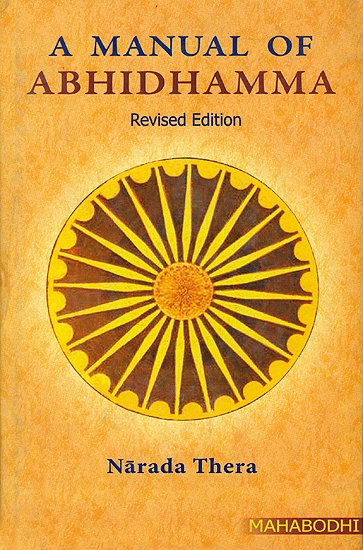Abhidhamma in Daily Life (by Ashin Janakabhivamsa)
by Ashin Janakabhivamsa | 66,666 words
English translation of "Abhidhamma in Daily Life" by Professor Ko Lay. Revised by Sayadaw U Silananda, International Theravada Buddhist Missionary University, Yangon, 1999...
Author’s Preface
Paja sabba sussayantu,
Vutthahanta sumangala.
Dusentu duggatimgamim,
Purentu sabbaparamim.
May all beings residing in their respective dwellings sleep soundly and have pleasant dreams! Being blessed in glory, may they awake early in the morning with auspiciousness! May they be able to abstain from evil deeds which lead to the four woeful abodes. May they be able to fulfil the thirty Paramis (Perfections) incessantly and attain spiritual maturity stage by stage!
Taking into consideration the situation of the present day, we find that the first three of four moral virtues called Brahmaviharas, namely, loving-kindness (metta), compassion (karuna), sympathetic joy (mudita) and equanimity (upekkha) appear to have ceased to flourish, to have dried up in the human mind. The element of 'heat' generated by beings through such cessation of virtues incinerates even the virtuous, who now find themselves on the verge of drying up.
What Is Meant By the 'Heat Element'?
The 'heat element' is nothing but greed (Lobha), hatred (dosa), conceit (mana), jealousy (issa) and avariciousness (macchariya), that leave no room for sympathy or compassion for one another. That 'heat element' causes drying up of virtuous elements not only in the present but also in the coming existences in the round of rebirths (samsara). Therefore people should endeavour in this very life to the best of their ability to extinguish the 'heat element' and seek to reside steeped in the cool elements of loving kindness, compassion, sympathetic joy, and equanimity which are the four sublime states of living (Brahmaviharas).
What is Samsara?
The material world in which beings live is not to be mistaken as samsara. The continuous coming into existence of consciousness (citta), and mental factors (cetasikas) together with matter (rupa) in succession is called samsara in the ultimate sense. [sam=in succession; sara going, wandering.)
What Are Human Beings, Devas, and Brahmas?
Consciousness (citta) and mental factors (cetasikas) are collectively called nama, the mind. The successive coming into existence of this nama and rupa, the material element, in combination is nominally called human being, deva and brahma, or person, being, I, he, she, man, woman, etc. In the ultimate sense, there are no humans, devas or brahmas, or other beings apart from nama and rupa.
Why Do Nama and Rupa Come Into Existence?
Nama and rupa do not come into successive existence without causes. They arise because of external objects experienced at the present and the kamma done in the past existences preserved in one’s continuum. Hence, note that the two root causes of nama and rupa are external objects and past kamma.
The Important Causes. Of the two causes, the external objects experienced are not so important, because they only serve as images that bring about various internal states of mind (consciousness). The important thing is for one’s (internal) mind to be wholesome when perceiving various external objects, good or bad.
“If the (internal) mind is always good, all the nama and rupa of future existences will also be good.” Even though one has passed away from one existence, good nama and rupa will appear again, as good humans, good devas and good brahmas. If their internal minds are wicked, beings will be reborn in hell (niraya) or become ghosts (petas) , or animals with ugly minds and bodies.
Proper Attitude (Yoniso Manasikara) Will Produce a Good Mind.
Only when there is yoniso manasikara, will the mind be good. Judicious consideration of whatever one comes across is called 'yoniso manasikara'. Nowadays people tend to abbreviate 'yoniso manasikara' into 'yoniso'. Due to proper attitude, unwholesome mind will not appear; only wholesome mind will arise. Wrongful consideration will not foster a good mind even under favourable circumstances for its arising. Correct mental attitude is, therefore, the most important for all beings to acquire a good mind.
Causes for having or not having proper attitude are (1) reading or not reading good books, and (2) learning from the wise or not. Those who read good books and those who learn from the wise will amass useful knowledge. If those who have thus amassed knowledge, make resolution as “I will always have good mind arise in me”, they tend to have rightful consideration regarding circumstances they meet with.
Those who neither read good books nor learn from the wise will not amass useful knowledge and will not be able to better their mind or to cultivate good thoughts
Therefore, a new treatise entitled “Abhidhamma in Daily Life” is written for the welfare of people, with a view to assist them in acquiring good conduct.
The author’s aim can be summarised as follows.
- For the readers to develop rightful attitude regarding the circumstances he or she encounters, to be always broad-minded, to live the way of noble living (Brahmavihara), and to conduct a harmonious life.
- For the readers to be always in good mood, to develop an unwavering attitude towards life and to be able to live in grace whether they are wealthy and happy being successful and prosperous, or whether they are poor and unhappy meeting with failure and calamity.
- For the readers to be those who are making effort to fulfil the Paramis (Perfections) such as dana (charity), sila (morality), etc., in this existence so that they may elevate themselves gradually from the next existence till the attainment of Nibbana.
Maxim:
Just as you look at your image in the minor daily and tidy yourself, so you should read this treatise and reflect on yourself every day.
"Namo Tassa Bhagavato Arahato
Sammasambuddhassa"
"Veneration to the Exalted One, the Homage Worthy,
the Perfectly Self-Enlightened"
